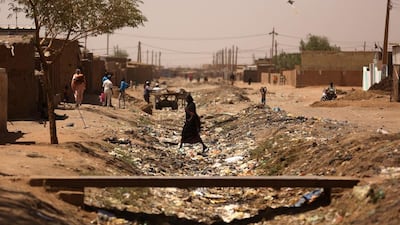Amir Tag Elsir’s recent fiction belongs to a branch of literature that is explicitly concerned with the nature of writing, with the relationship between the imagined world and the real.
In The Grub Hunter (2010), which was shortlisted for the International Prize for Arabic Fiction in 2011 and published in English in 2012, we are introduced to the narrative of Abdallah Harfash, a secret agent who loses a leg in an accident and decides to become a writer: "I will write a novel. Yes, I will," he says in the opening line of the book, before taking us on a journey in which he encounters a kind of mentor, teasingly named AT, whose own short novel appears in the course of the text.
Telepathy shares many of these qualities, only here the narrator is already – like Elsir himself – an established Sudanese novelist. "I don't write from experiences that don't involve me at all," he says near the beginning of the novel, set in Khartoum, the Sudanese capital.
“For the most part,” he tells us, “my writing has been a mix of reality and imagination – something inspired by my surroundings and something I invent.”
This methodology has recently resulted in the appearance of a successful novel named Hunger's Hopes (a title that wouldn't look out of place on Tag Elsir's own backlist), which the narrator tells us he wrote "faster than any previous novel, driven by powerful inspiration, as one road block after another vanished".
Yet despite the uncharacteristic speed with which his book arrived, he is confident that it is the product of his own literary endeavour, a work in which – as in all of his books – reality has been so thoroughly transformed that no reader could ever think to himself, “ That character’s me”.
This confidence is misplaced. Fairly early in the story, the narrator encounters a troubled figure – teeth marred by tobacco, always clothed in thobe, turban, goatskin shoes – who seems to have access to his private thoughts and actions ("I didn't ask him how he knew that I had returned from my trip ... It seemed to me he was stalking me or could predict my movements"), and who shares the name of a character – Nishan Hamza Nishan – in Hunger's Hopes. Our narrator is incredulous: "No one has a rare name like this, at least not in the combination I had struggled hard to concoct to avoid possible repercussions."
At about this stage he begins to suspect that the Nishan of his novel and the Nishan of real life are one and the same, and that the latter has communicated the plot of his book to him telepathically. It is here that we arrive at one of Telepathy's central themes: the responsibility that artists have to their creations. Reflecting on the awful fact that in the pages of Hunger's Hope Nishan is afflicted with glandular cancer and offered "no hope of a cure", the narrator resolves that it is now his duty to create for the real-life Nishan – "a poor, desperate, marginalised man" – "a better destiny than the one I had granted him in the text."
Elsir handles most of this with verve and pace. The voice of his narrator is vivid, inflected with appealing moments of vulnerability (“I grasped the book with uncharacteristic braggadocio, which I feign occasionally in fleeting moments of weakness”), and sometimes pleasingly sardonic: “Najma came out of the lecture hall looking as if she had just been liberated from a long, boring period of incarceration”; “She felt so superior to the world around her that she seemed even to breathe sparingly.”
Too often, however, Elsir’s prose lacks precision. The effects of this are particularly damaging in a novel that asks us to believe we are being addressed by an accomplished writer. What novelist, even in conversation, would allow herself the phrase “I wanted to laugh ‘till I died”? And who would allow the pleonasm in the sentence “I didn’t reply and quickly shot outside”?
Similarly redundant constructions (“Shaken, I tried to relax”) occur in the book with dispiriting frequency, and are compounded by Elsir’s tendency to deform sentences with discordant words and phrases.
For all of that, Telepathy is an entertaining and thoughtful novel that raises interesting questions about the nature of creativity, forgiveness and identity. It is a shame, then, that its many infelicities leave us not with the resonant literary exploration of those themes that lies within Elsir’s grasp, but rather (to borrow a phrase from the start of his novel) with a story that shows evidence of a fertile imagination, but is often poorly written.
Matthew Adams is a London-based reviewer who writes for the TLS, the Spectator and the Literary Review.

